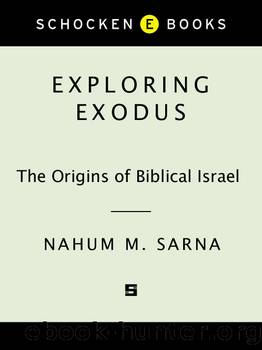Exploring Exodus: The Origins of Biblical Israel by Nahum Sarna

Author:Nahum Sarna [Sarna, Nahum]
Format: epub
ISBN: 978-0-307-76069-2
Publisher: Schocken Books
Published: 2011-08-09T16:00:00+00:00
CHAPTER VII
The Ten Commandments; Moses and Monotheism
EXODUS 19â20
Preparations for the theophany
It was in the third month following the Exodus that the Israelites arrived at the wilderness of Sinai, and encamped before the mountain where Moses had first experienced the call to leadership.1 Thus far the relationship between God and Israel had been wholly one-sided, with Israel being the passive beneficiary of Godâs active role in history. It was God who took the initiative in sending Moses to the pharaoh, who coerced the tyrant by way of the plagues to liberate Israel, who performed the wonders at the sea, and who supplied the Israelitesâ physical needs in the wilderness. Now a new phase in Israelâs history is about to commence. Godâs redemptive acts on Israelâs behalf require a reciprocal response on the part of Israel. The liberated multitude of erstwhile slaves must be united not only by a vital sense of a shared tragedy and a common experience of emancipation, but even more by bonds of perceived idealsâa vision of a new order of life, namely, the establishment of an essentially different kind of society from what had hitherto existed.
The precondition for the fulfillment of this goal, indeed its instrumentality, is to be the forging of a special relationship between God and Israel. This relationship is to be sealed by a covenant, which would establish Israel as Godâs âtreasured possession,â as âa kingdom of priests and a holy nation.â2
The full range of meaning of the first designation, âa treasured possessionâ (in Hebrew, segullah),3 has been illuminated by epigraphic finds from the ancient Near East. From the city of Alalakh on the River Orontes in Turkey comes a royal seal of King Abban that cannot be later than the fifteenth century B.C.E. The term sikiltum,4 the Akkadian equivalent of segullah, is used in the titles of the monarch in parallel with âservantâ and âbelovedâ of a god.5 Another text derives from the city of Ugarit. At the moment when the royal palace was being destroyed soon after the year 1200 B.C.E.,6 scribes were baking some inscribed clay tablets in the kiln. The fate of the royal officials is unknown, but the abandoned tablets remained in place for the next three thousand years until discovered by modern excavators. One of the documents in question is a translation into Ugaritic of an Akkadian letter sent by the Hittite suzerain to his vassal Ammurapi, the last known king of Ugarit. Here the Hittite overlord characterizes the latter as âhis servantâ and âhis special possessionâ (sglth).7 Clearly, the biblical designation of Israel as Godâs âtreasured possessionâ is used in a special sense that has political and legal implications.
The second description of Israel as âa kingdom of priests and a holy nationâ8 alludes to the consequences that flow or should flow from that special relationship with God. The priests are set apart from the rest of the people by dedication to the service of God, by their consecration to a distinctive way of life that gives expression
Download
This site does not store any files on its server. We only index and link to content provided by other sites. Please contact the content providers to delete copyright contents if any and email us, we'll remove relevant links or contents immediately.
Hebrews, James by George H. Guthrie & George H. Guthrie(452)
Ideology by Eagleton Terry;(444)
Israel: Ancient Kingdom or Late Invention? by Daniel I. Block(442)
The 9.9 Percent by Matthew Stewart(421)
Take Back Your Time by Christy Wright(411)
The New Oxford Annotated Bible with Apocrypha by unknow(409)
Eating the Bible by Rena Rossner(404)
Insights on Hebrews by Charles R. Swindoll(401)
The Book Every Leader Needs to Read by 48 Authors(397)
Psalms, Proverbs, Ecclesiastes, and Song of Songs by John W. Hilber & Tremper Longman III & Duane Garrett(369)
Commentary on the Torah by Richard Elliott Friedman(346)
Commentary on James (Commentary on the New Testament Book #16) by Robert H. Gundry(344)
Judges: Volume Two by unknow(339)
The Jew in the Lotus by Rodger Kamenetz(336)
Who Wrote the Bible? by Richard Elliott Friedman(334)
NKJV, Ignite, eBook by Thomas Nelson(330)
Job, Ecclesiastes, Song of Songs by August H. Konkel & Tremper Longman III(328)
Proverbs, Ecclesiastes, Song of Solomon (Ancient Christian Commentary on Scripture) by J. Robert Wright(324)
Reading the Bible with Rabbi Jesus by Tverberg Lois(307)
